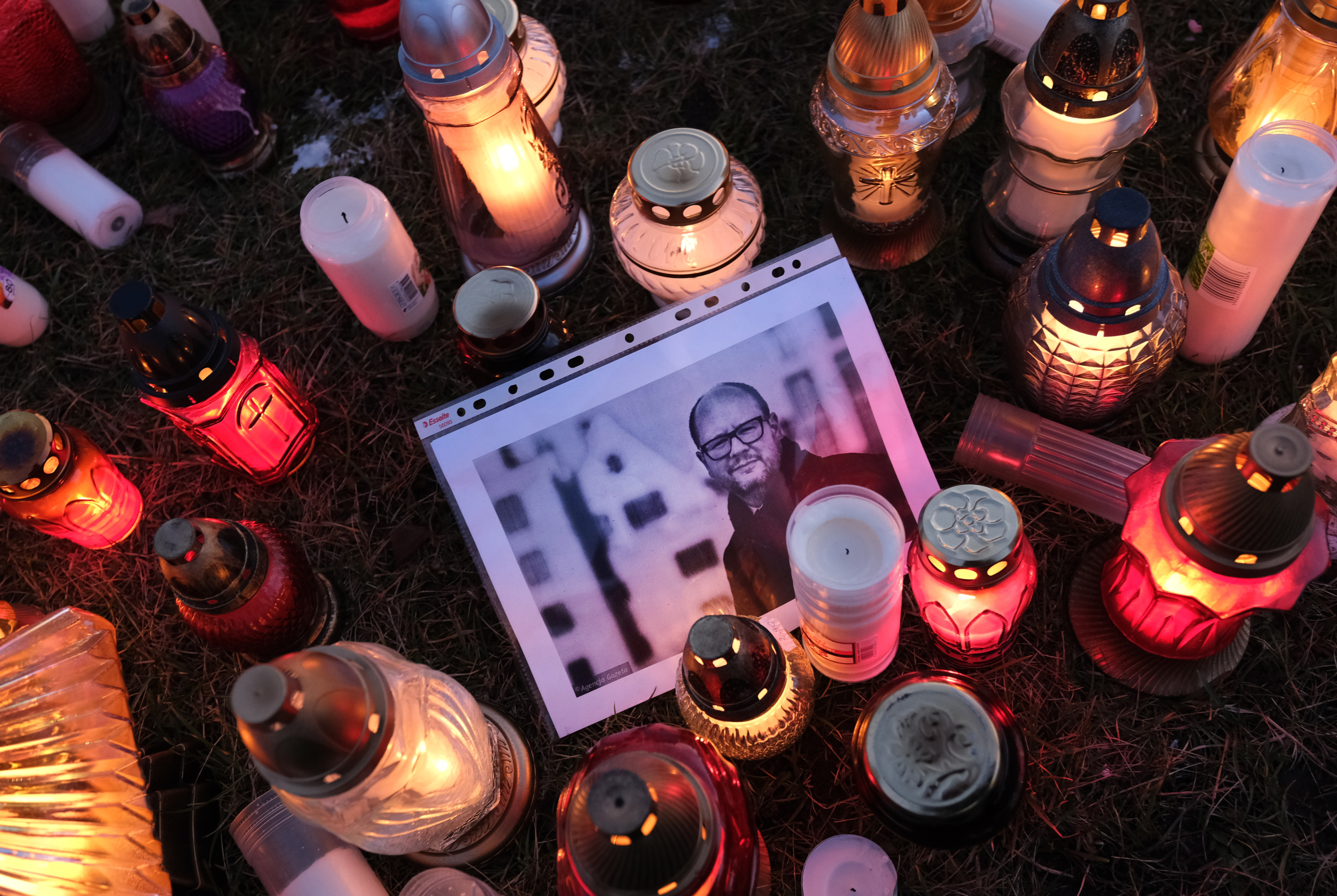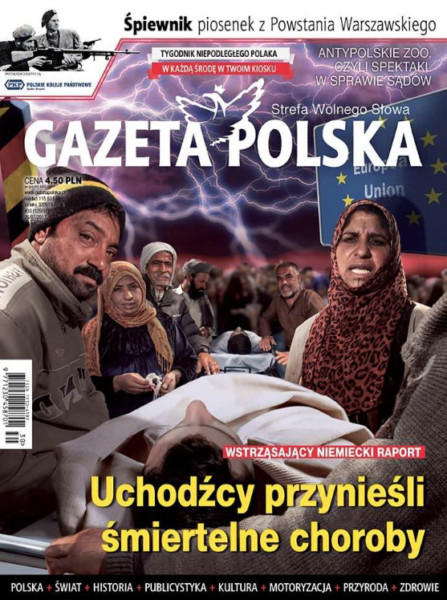Sign up for The Media Today, CJR’s daily newsletter.
On the night of January 13, Paweł Adamowicz, the mayor of Gdańsk, stood onstage at a charity event. Before hundreds of his city’s residents, he led a countdown that would signal a fireworks and laser show. As Adamowicz reached zero and the fireworks began, a man rushed across the stage with a large knife and stabbed him repeatedly in the chest. The man then grabbed a microphone and ran about, waving his knife and yelling that he spent five years in prison because of Adamowicz’s political party, the Civic Platform.
Adamowicz died the next day from wounds to the heart and diaphragm. Authorities identified the alleged attacker as Stefan W., describing him as having a history of mental illness and crime.
While the murder lacked a clear political motive, it has shone light on deep political and media polarization in Poland and has prompted calls for an end to the aggressive, sensationalist rhetoric—what some call hate speech—that has become commonplace in Polish media. Adamowicz’s death has also prompted renewed attention to the far right Law and Justice Party’s (PiS) sustained and systematic attacks on Polish media since it came to power in 2015.
Soon after the murder, reactions from the media, politicians, and activists poured in. Adamowicz’s widow, Magdalena Adamowicz, blamed the government-controlled public television for her husband’s murder. “It’s the responsibility of TVP. [Its] hate speech influenced the killer to choose Paweł as a victim. My husband was killed by words.”
The editorial board of Poland’s main daily newspaper, Gazeta Wyborcza, echoed Mrs. Adamowicz. “Our appeal…is to all those who—like us—are fed up with violence and hostility in the public debate. We all have the right to require politicians to take responsibility for their words.” Another major daily, Rzeczpospolita, called for a “stop of hate speech” and cited a “brutalization of the public debate” and “a wave of hatred that spills both from traditional media and the internet.”
During Adamowicz’s funeral mass, Ludwik Wisniewski, a Dominican priest and friend of the late mayor, issued a dramatic appeal to the audience. “You have to end hate. You have to end hate speech. You have to end contempt. You have to end unjust accusations of others. We will no longer be indifferent to the spreading of poison.” In a joint statement, Polish mayors said of hate speech in media, “It must end before it leads to another tragedy.”
Olga Tokarczuk, the Polish Man Booker International Prize-winning novelist, wondered in an opinion piece in The New York Times: “I worry about our immediate future. Will we go back to the way things were before this senseless death, or will it sober us up somehow?”
Poland’s media has long been seen as partisan and sensationalist, as many outlets adhere to certain political lines. While polarization began soon after the fall of communism and continued through the early 2000s, according to Stanley Bill, an Associate Professor of Polish Studies and the Director of the Polish Studies Programme at the University of Cambridge, many of today’s divisions can be traced back to the 2010 crash of a Polish Air Force aircraft in Smolensk, Russia. The crash killed Lech Kaczyński, then Poland’s president, as well as the Chief of the Polish General Staff and many other senior military officers.
“Smolensk made the existing divisions much more serious,” Bill says. While one portion of the political class, media, and society accepted it as a tragic accident, another portion—which includes PiS and its leader, Jarosław Kaczyński (the brother of Lech Kaczyński)—claims that the crash was part of a conspiracy.
When PiS won the 2015 elections, it gained a level of control over government unprecedented since the fall of communism. PiS then began a process of gutting public media in Poland and systematically attacking private media that it found oppositional.
Coverage by Poland’s public broadcasting corporation, Telewizja Polska (TVP), has always tended to mirror the views of whatever government is in power. But it has never changed as much as it has under PiS. When Jacek Kurski, a former Member of the European Parliament and a PiS loyalist, took the reins in 2016, he forced out hundreds of journalists and replaced them with people loyal to the party. (Kurski did not respond to repeated requests for comment.)
Piotr Owczarski is one of those journalists. In March of 2017, TVP fired him from his role as a deputy head of the information service. Owczarski claims that, like dozens of others, he was let go without cause.
“Many positions were filled by people without experience, who didn’t even have a university degree,” Owczarski says. “Veteran journalists were let go and replaced by satirists and young right-wing journalists full of hatred and without experience.”
A similar thing happened to Maciej Kluczka, who worked for a branch of state-owned national radio broadcasting organization, Polish Radio, after PiS came to power. In 2016, after he interviewed PiS Member of the European Parliament, Ryszard Czarnecki and asked questions he didn’t like, Kluczka says he was summoned by his boss and then suspended for two weeks. He later chose to leave, but troubles followed Kluczka to Polish Radio in Warsaw, where he began a new position on a permanent contract. After four days, he was fired again. “Even the boss could not explain it,” Kluczka, now a reporter for the private network TVN, says.
Today, TVP broadcasts tend to follow the same pattern of stories, according to Bill—some that trumpet the grand successes of government, some that criticize the opposition, and some that preach the supposedly negative effects of Muslim migration to Western Europe.“They’ve become so grotesque that even moderate supporters of government find them cringeworthy,” Bill says.
Adam Szynol, a 48-year-old associate professor of media at University of Wroclaw, was in his late teens when communism fell. “Never in my life have I ever observed such blunt propaganda,” he says.
International watchdog organizations have also warned about PiS’s attacks on the media. Reporters Without Borders has downgraded Poland in its press freedom ranking, from number 18 in the world in 2015 to number 58 in 2018.
For Bartosz Wieliński, Gazeta Wyborcza’s foreign editor, the dramatic changes in the media landscape and the attacks on the press from PiS are depressing, and he doesn’t think they’ll end anytime soon. But he also sees this time as a golden age for his work. “I’m building new sources. People who before wouldn’t talk are now open,” he says. “But at the same time, now is when my country needs a journalist to stand up to this challenge.”
Ironically, Gazeta Wyborcza, the country’s most prominent left-leaning daily newspaper, is run by Jarosław Kurski, Jacek Kurski’s estranged older brother.
According to Jarosław Kurski, under PiS, Gazeta Wyborcza has been the target of intense government attack. “Our destruction is a dream for the regime. It would be the final act of the national revolution of theirs,” Kurski says. One of the government’s tactics, Kurski says, is to flood Wyborcza with dozens of libel lawsuits after they publish stories that are against the government’s interests. Reports emerged in 2016 that the PiS government, through affiliate organizations, tried to buy a controlling share of Agora, the parent company of Gazeta Wyborcza. (CJR was unable to confirm this). The newspaper’s founders can restrict who can purchase a controlling share. Kurski also noted that, in 2016, the billionaire philanthropist George Soros bought a 12-percent stake to protect the paper.
The government has also attacked Gazeta Wyborcza and other publications by cutting advertising purchasing from state companies and Polish ministries. According to Kantar Media, a British research firm, Gazeta Wyborcza received roughly $530,000 in ad revenue from state companies and various Polish ministries between January and July 2017. For the same timeframe in 2018, the newspaper received roughly $56,000 dollars. Meanwhile, conservative publications saw large increases in ad revenue.
Jarosław Kurski, of Gazeta Wyborcza,agrees that the media environment played a supporting role in Adamowicz’s murder. Kurski is convinced that Stefan W., the man accused of killing Adamowicz, was brainwashed by the national TV propaganda during his five years in prison. “For me, it’s an odd situation. My friend died because of this propaganda. And at the head of the public TV, orchestrating this propaganda, is my brother,” he tells CJR. Referring to Stefan W., Kurski adds, “He said himself: my dream is to see Poland controlled by Kaczyński as a dictator. This is why opposition media are key.”
While there’s no direct evidence that the media or political environment contributed to this tragedy, Adamowicz was the target of attacks from right-wing groups, one of which sent him a “political death certificate” because of his willingness to accept refugees in Gdańsk. TVP also attacked Adamowicz on his refugee stance, and once aired a video, featuring menacingly framed clips of migrants, saying that he invites and welcomes immigrants in Gdańsk. The broadcast implied that Adamowicz was trying to draw attention away from possible government investigations into personal wrongdoing.
Magazines on the left and the right run aggressive covers, but conservative media often drums up hatred against migrants specifically. In 2017, for instance, the cover of the conservative weekly, Gazeta Polska, read, “Refugees brought deadly diseases”:
For Jacek Karnowski, the editor in chief and co-founder of the major conservative weekly magazine wSieci, the reasoning behind his sometimes aggressive covers is largely economic. “In today’s situation, where media is losing audiences, the only argument for your existence is to say something that is important, to alarm, to make your point, to argue,” Karnowski says. According to Kantar Media, in the first quarter of 2016, public companies purchased nearly $30,000 in ads in wSieci, a dramatic increase from the year before.
Karnowski expresses some doubt about how his and other magazines choose cover images and headlines. “Maybe we should all tone it down a bit, and if both sides do it, it would be good for Poland. There is a reflection that we all have gone too far,” he says.
Łukasz Warzecha, a columnist for the conservative magazine, Do Rzeczy, which also sometimes publishes aggressive covers, finds Karnowski’s reflections ironic. “Karnowski’s magazine is the one that’s rightly accused of stirring emotions and regularly going too far, so if he says perhaps we’ve gone too far, it’s a good thing. He’s the one who should think about this above all,” Warzecha says.
Has America ever needed a media defender more than now? Help us by joining CJR today.




